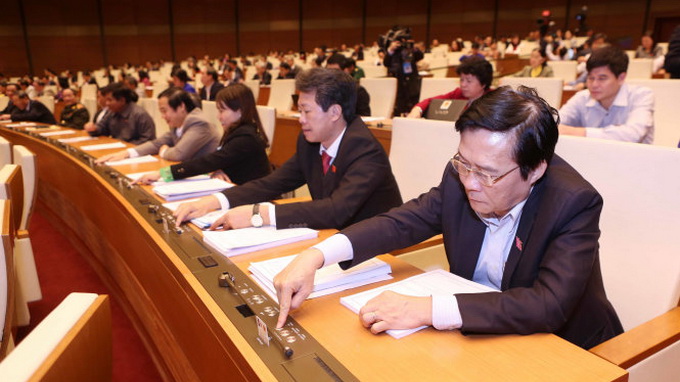Heads of legislative delegations across Vietnam were assembled on Monday for an urgent meeting to discuss an unusual decision: postponing the implementation set for Friday of the country’s revised Penal Code after it was found to be in serious need of revision.
The Standing Committee of the lawmaking National Assembly chaired an urgent meeting with the heads of legislator delegations across the country to discuss the postponement of the implementation of the revised Penal Code, which had been set for the beginning of July.
The National Assembly is Vietnam’s legislative body, whose 500 members are elected every five years via a national election.
On November 27, 2015, the 13th National Assembly passed with an overwhelming majority of over 84 percent the revised Penal Code, which is scheduled to be put into practice this Friday.
Shortly after its passing, however, the code was found to contain three serious faults by a legal expert in the country.
In April, former chief justice of the criminal court of the Supreme People’s Court of Vietnam Dinh Van Que was quoted by Tuoi Tre (Youth) newspaper as saying “there are more than three faults in the Penal Code,” before going on to address several other issues.
An unusual meeting
A Tuoi Tre source disclosed that after revisions carried out by the National Assembly Committee on Judicial Affairs in response to analyses by legal experts and the public, over 90 details in the revised Penal Code were found to be in need of adjustment.
“I just can’t wrap my head around how a code passed by nearly 500 National Assembly members could contain such serious mistakes,” the source said.
After a period of consideration and discussion, the Standing Committee of the National Assembly finally decided to convene the Monday meeting, only four days prior to the scheduled implementation of the revised code.
Lawmakers would vote among themselves on whether or not they would agree to postpone the Penal Code’s implementation day, with the results of the vote to be counted by the assembly before the official decision is made.
“An unusual meeting [among all members] of the assembly should have been held to discuss this matter, but we have no other choice as there is hardly any time left,” the source said. “This is the most plausible way for the 13th National Assembly to correct our mistake.”
Should an agreement be reached among National Assembly members on the postponement, the new implementation day would be pushed back to the start of 2017, and the newly elected National Assembly would be left in charge of the revisions.

Members of the 13th National Assembly of Vietnam are seen pressing buttons to vote on the revised Penal Code at a general meeting in Hanoi on November 27, 2015. Photo: Tuoi Tre
Who’s to blame?
This is not the first time that the National Assembly has had to revise a law before it is implemented.
In June 2015, the legislature was forced to adjust an article in its previously passed Law on Social Insurance.
The mistake is now on a much larger scale, as the Penal Code affects a range of aspects of the justice system of Vietnam.
“There are just so many problems with the current version of the code that they must be solved before it is implemented,” said Nguyen Anh Son, head of the Nam Dinh Province legislative delegation.
“The National Assembly takes full responsibility before the Vietnamese people, and the immediate responsibility lies with the nearly 500 legislators who voted for the passing of the code,” Son admitted.
Meanwhile, former Minister of Justice Ha Hung Cuong told Tuoi Tre over the phone that the ministry had been in charge of drafting the revised code, but the final decision to review and pass it into effect was for the National Assembly to make.
“In retrospect, we were put under immense pressure to finish drafting such a significant code in such a short time,” Cuong claimed. “I had asked for more time but the request wasn’t approved.”
Agreeing with former Minister Cuong, the Tuoi Tre source explained that there had only been one and a half months between the report on referendum results and the passing of the code.
“There’s no use crying over spilt milk,” the source concluded. “What matters now is that the 13th National Assembly acknowledges its faults and comes up with solutions.”
Like us on Facebook or follow us on Twitter to get the latest news about Vietnam!


















































